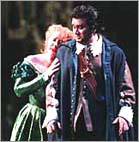Now a Traditional 'Lucia,' With the Frills Fans Love
'Lucia di Lammermoor' at the Metropolitan Opera
ANTHONY TOMMASINI
12/18/99
Last season the performances at the Metropolitan Opera by the soprano Ruth Ann Swenson in the title role of Donizetti's "Lucia di Lammermoor," her first with the company, were undermined, it seemed, by the clunky, grim new production of the opera by Nicolas Joel. That production has been cleaned a bit this season. The stage direction is clearer; the lighting is more effective. It is still unimpressive, but at least less distracting.
 |
|
| Ruth Ann Swenson and Ramon Vargas in 'Lucia di Lammermoor.' (Sara Krulwich/The New York Times) | |
Ms. Swenson has been singing the role again at the Met, and her performance on Wednesday night was far more confident and successful. The qualities that endear her to opera fans were abundant. Her sound was radiant, warm and lovely. Few sopranos are more technically skillful. Ms. Swenson supports her voice and focuses her tone so that even her softest phrases shimmer and fill the house without any sense of force. Her handling of the coloratura embellishments and roulades was elegant and musical. She is still not the most textually incisive singer. But this is beautiful vocal artistry.
Yet Ms. Swenson still does not delve deeply enough into Lucia's character. From the opening aria, as she waits by the fountain for a rendezvous with her secret lover and tells her lady-in-waiting about the ghost she has been seeing lately, that of a deserted maiden, Lucia must already seem to be a mentally fragile young woman. As she slips into madness and murders the man she is forced to marry, the progression should seem inevitable, not a tragic turn coming out of nowhere. Ms. Swenson was perhaps too concerned with lovely singing, and her portrayal lacked emotional complexity and volatility. That said, her singing was indeed lovely, and that is worth some tradeoffs.
The tenor Ramon Vargas, a fine bel canto stylist, was almost the opposite. He tore into the role of Edgardo, Lucia's beloved, singing with ardor and impassioned lyricism, sometimes at the expense of vocal elegance. Leo Nucci brought his husky baritone voice to the role of Enrico. The bass Michele Pertusi was a stentorian Raimondo, Lucia's tutor.
After presenting the original 1835 version of the opera in earlier performances this season, conducted by Sir Charles Mackerras, the Met has returned to the familiar version, complete with the interpolated high notes and the traditional cadenzas that "Lucia" buffs love. Edoardo Muller conducted a supple and nuanced performance.
The final performance of the season is tonight.